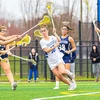 Economics Assistant Professor Paul Holmes displays the framed jersey from New Zealand’s national cricket team. His sister, Anna, who works in marketing for the team, gave it to him for his birthday in 2007. It was signed by all members of the team. |
There’s more to sports than quarterback efficiency ratings, on-base percentages, and Xs and Os.
A different type of insight into college and professional sports can be gained through statistical analyses, which is what Assistant Professor of Economics Paul Holmes has delivered in a series of essays. Of course, most fans won’t see them in the academic quarterlies in which they have been published, but they are reading about his perspectives on their local sports pages.
Drawing upon his lifelong enjoyment of sports – as a spectator and player of soccer, cricket, tennis and touch rugby in his native New Zealand – and his study of economics, math and statistics in the United States,
Dr. Holmes has written articles examining segments of college football, Major League Baseball and the National Basketball Association. All three papers were part of his dissertation at the University of Illinois, Urbana-Champaign, and two have been published in scholarly journals.
His, “Win or Go Home: Why College Football Coaches Get Fired,” published in the April 2011 issue of the Journal of Sports Economics, explored the complex effects of tenure and organizational expectations on probability of coach dismissal in high-profile NCAA Division I football.
By examining discharges of head football coaches from 1983 through 2006, Dr. Holmes concluded that while performance, as measured by win percentage, is an important determining factor, there is strong evidence that the effect of performance is mitigated by other factors such as organizational expectations, the values and allegiances of the organization, and the power of the head coach as demonstrated by tenure. A stronger recent performance bodes well for a coach, but a stronger historic performance increases the odds for dismissal.
Evidence shows that alumni head coaches have a much lower rate of dismissal for both short and long tenures, and black head coaches with fewer than four years of service are more likely to be discharged than equally qualified non-black counterparts.
Despite the journal’s niche readership, Holmes’ essay didn’t go unnoticed by the University of Illinois sports beat writer for the St. Louis Post-Dispatch. In 2009 and again in 2011, Holmes, who earned his doctoral degree in Economics and master’s degrees in Economics and Statistics at the University of Illinois, was a prime source for hard data and comment
relating to Fighting Illini Head Football Coach Ron Zook and whether he would be fired by the Big 10 school.
Holmes suggested in 2009 that “Zook would be a good candidate for being fired, except for his (2007) contract extension;” and indeed, at that time, he was not fired. For all his accolades of 2007 – taking his team to the Rose Bowl and being named “Big Ten Coach of the Year” – Zook had only one more winning season and was fired this past December after his team’s mid-season collapse.
In his Major League Baseball essay, Holmes concluded there is a small degree of salary
discrimination against black players in the lower half of the salary distribution. “New Evidence of Racial Discrimination in Major League Baseball” was published in Labour Economics. His “Day to Day with the NBA Superstars” essay examined the impact of star players on road game attendance.
A pure love of research and use of relatively new statistics methods energized Holmes. “I realized that I could combine my background in statistics and economics with my passion for sport and produce something that would lead to me having a career,” said Holmes.
Holmes can trace his fascination with statistics to his childhood, when his most prized possession was a copy of Who’s Who in New Zealand Cricket, which was crammed with biographies and statistics.
He arrived in the U.S. in 2001, initially enrolling at Purdue University before transferring to Illinois.
In 2009 he joined SUNY Fredonia’s School of Business faculty, which is pursuing accreditation by the Association to Advance Collegiate Schools of Business, a global accrediting body for business schools in over 80 countries.
Holmes uses examples from sports economics in his upper-level courses which address labor and employment, public sector economics and strategic interaction.



